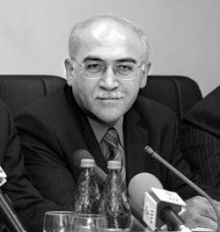A roundtable with the polemical title “Ukraine-Azerbaijan: Oil or Democracy?” was supposed to smooth tensions following the arrest of Rasul Guliev, the former speaker of the Azerbaijani parliament. Serhiy Yevtushenko, advisor to the Minister of Foreign Affairs of Ukraine and head of the international section of the PORA Civic Party, who was recently deported from Baku while he was still at the airport, said, “Ukraine has fallen victim to a covert operation by the Azeri secret services.” In Yevtushenko’s opinion, one of the elements of this “covert operation” is the fact that Azerbaijan sent a request to Interpol to apprehend Guliev just hours before he was due to return home. It was thus impossible to prevent Guliev’s arrest in Simferopol. Yevtushenko, who recalled that the Ukrainian president and his foreign minister were in London that day, apologized to the Azerbaijani opposition “on behalf of Ukrainian democratic parties.”
Yevtushenko’s statements were soon upheld by Mykola Katerynchuk, one of the most well-known faces in the Our Ukraine People’s Union (NSNU). The representative of the ruling party chose to lay the blame on law-enforcement officers, although in all civilized countries the government is also responsible for coordinating efforts with law-enforcement agencies, no matter who occupies the post of prosecutor general, if such a post is held at the moment. Katerynchuk said the NSNU will be urging the prosecutor general to issue an apology. “Our parliamentary faction has submitted a draft resolution on the situation in Azerbaijan on the eve of the parliamentary elections,” the MP added. He revealed that the NSNU will consider “sending observers and other experts to Azerbaijan, who could help ensure fair and democratic elections.”
Vladyslav Kaskiv, a well-known “expert on honest elections,” advisor to the president, and chairman of PORA’s political council, is harsher in his conclusions. “Today in the post-Soviet space Ukraine behaves like a bull in a china shop,” he said. “We are not using existing opportunities, we are losing friends and gaining more and more enemies.” To rectify the situation, Kaskiv suggests establishing a new institution, the Ukrainian Agency for International Development, which would promote cooperation among associations and non-governmental organizations throughout the world, especially in the post-Soviet space.
Issa Gambar, the head of the Musavat Party and leader of the Azadlyg opposition bloc, listened to the speeches of Ukrainian politicians with typical Caucasian unflappability. He has long been well versed in Ukrainian politics, having signed an agreement of cooperation with Our Ukraine in 2003. Gambar chose to be tightlipped about the Guliev incident, stating that he is glad the “misunderstanding” was cleared up so quickly.
Getting down to the chief topic of the roundtable, Gambar noted that “you cannot force people to choose between oil and democracy...Oil should work for democracy, and democrats should see to it that oil revenues are fairly distributed in society,” he said. “Only free elections in Azerbaijan will bring to power those forces that do not consider oil as an instrument of pressure on other countries, including Ukraine. We, the democratic opposition, have serious intentions to cooperate with Ukraine in all spheres, including the economy.” The No. 2 man in the party, Sulhaddin Akber, cited the following example: “Despite an agreement between Kyiv and Baku, 200,000 tons of oil have not yet reached Ukraine because Moscow has not given the go-ahead.” Katerynchuk shares this point of view. “It is now clear to us that the oil question is being tackled in the Kremlin, not in Baku. It would be naive to try to diversify fuel supply sources at the expense of Azerbaijan,” the MP said.
According to the roundtable participants, GUAM’s potential is not being tapped, while the strategic partnership between Ukraine and Azerbaijan exists on paper only. Among the reasons for this is “lack of democracy in Baku” and Russian policies. Gambar believes that Moscow is now trying to take revenge on Azerbaijan “so that it can exert pressure on the government of Mikhail Saakashvili in Georgia and then leave Ukraine isolated, thus making it more pliant and dependent.” The Azerbaijani opposition is determined to avert this kind of scenario if only because, according to Avez Kyazimov, Azadlyg’s representative in Ukraine, “in contrast to the 2003 presidential elections,” they see that international organizations and Western structures are more anxious about a fair election campaign. The Azeri opposition is also counting on Ukraine’s attention and assistance.
The head of the Musavat Party quoted US Secretary of State Condoleezza Rice: “For 60 years, we often thought that we could achieve stability without liberty in the Middle East. And ultimately, we got neither.” Commenting on this statement, Gambar said, “I am afraid that in pursuit of oil, we will lose not only democracy but also the oil itself...I recall how Churchill challenged his colleagues in Europe, who were pursuing a policy of appeasing Hitler. “Between war and dishonor you chose dishonor, and you also got war into the bargain.’ I am sure that once we choose ideals, we will be also able to achieve our specific goals,” the Musavat leader said, summing up.







